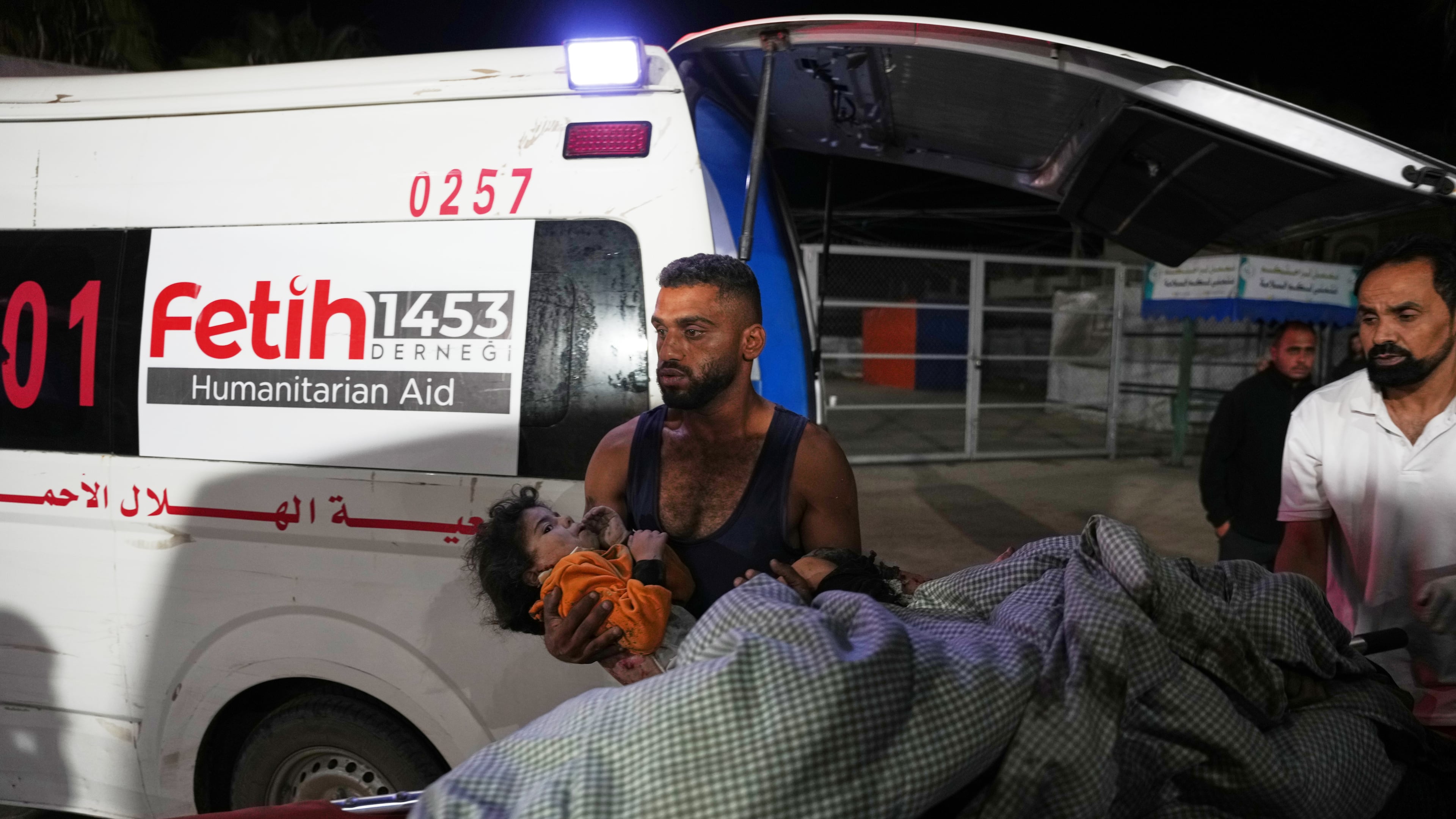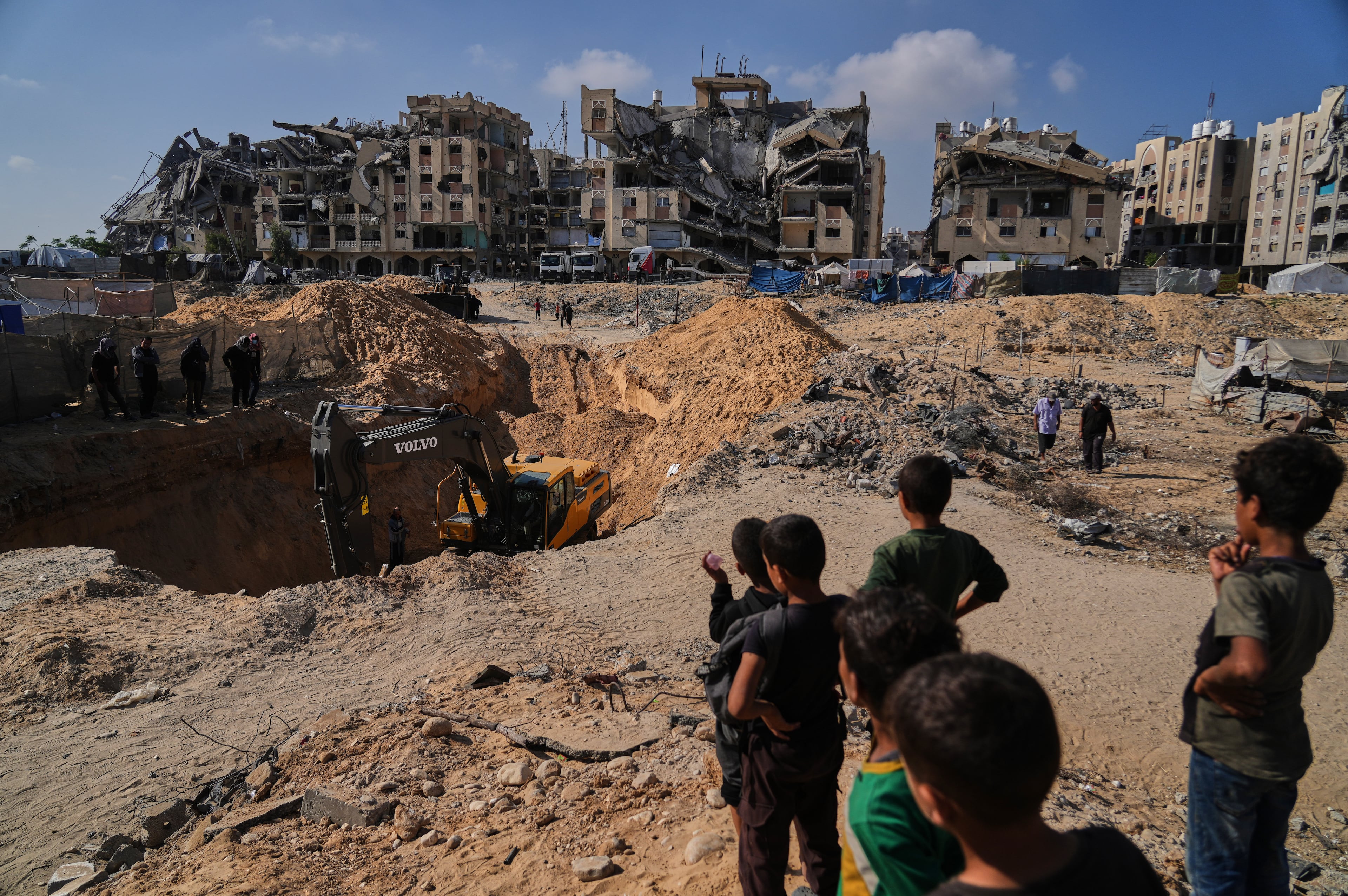Israel's military says ceasefire is back on as death toll from overnight strikes in Gaza reaches 104

DEIR AL-BALAH, Gaza Strip (AP) — Israel's military said Wednesday that the ceasefire was back on in Gaza after it carried out heavy airstrikes overnight across the Palestinian territory that killed 104 people, including 46 children, according to local health officials.
The strikes, the deadliest since the ceasefire began on Oct. 10, marked the most serious challenge to the tenuous truce to date.
Israeli Prime Minister Benjamin Netanyahu said he had ordered the strikes after accusing Hamas of violating the ceasefire for handing over body parts this week that Israel said were partial remains of a hostage recovered earlier in the war. That was compounded by the shooting and killing of an Israeli soldier during an exchange of gunfire in Rafah, the southernmost city in Gaza.
U.S. President Donald Trump, on a trip to Asia, defended the strikes, saying Israel was justified in carrying them out after Hamas killed the Israeli soldier, who also held U.S. citizenship.
Hamas denied any involvement in the deadly shooting and, in turn, accused Israel of "a blatant violation of the ceasefire deal.” It also said it would delay handing over the body of another hostage to Israel because of the strikes.
Trading accusations
Netanyahu called the return Monday of body parts a “clear violation” of the ceasefire agreement, which requires Hamas to return all the remains of hostages in Gaza as soon as possible. Israeli officials also accused Hamas of staging the discovery of some of the remains on Monday, sharing a 14-minute, edited video from a military drone in Gaza.
Israel’s Foreign Ministry spokesperson Oren Marmorstein said Hamas was responsible for the consequences of its ceasefire violation and attributed the high death toll from the strikes to the militant group using civilians as human shields.
Marmorstein said Washington was informed about the strikes and that they were carried out in full coordination with the United States.
Hamas replied in kind on Wednesday, saying the Israeli strikes reveal “a clear Israeli intention to undermine the ceasefire agreement and impose new realities by force.” The group also said in a statement that the U.S. is offering Netanyahu a "political cover" to carry on with its aggression in Gaza.
Hamas has said it is struggling to locate the bodies of the hostages amid the vast destruction in Gaza, while Israel has accused the militant group of purposely delaying their return.
There are still 13 bodies of hostages in Gaza and their slow return is complicating efforts to proceed to the ceasefire's next phases, which address even thornier issues, including the disarmament of Hamas, deployment of an international security force in Gaza and deciding who will govern the territory.
Marmorstein said Hamas was “trying to do everything possible to avoid” disarming.
Trump defends Israel
Trump told journalists aboard Air Force One on Wednesday that Israel “should hit back” when its troops come under attack.
But he said he’s still confident the ceasefire would withstand the escalation in violence because “Hamas is a very small part of the overall Middle East peace. And they have to behave.”
If not, they will be “terminated,” Trump added.
How the renewed strikes were triggered
An Israeli military official said Wednesday that the soldier in Rafah, identified as Master Sgt. Yona Efraim Feldbaum, 37, was killed by “enemy fire” that targeted his vehicle on Tuesday.
The official, who spoke on condition of anonymity to discuss confidential military operations, said Israeli troops in the area came under attack numerous times on Tuesday as they worked to destroy tunnels and Hamas infrastructure.
Hamas insisted it was not involved in the Rafah gunfire, reiterated its commitment to the ceasefire and called on mediators to pressure Israel to stop.
The Israeli military said in a statement Wednesday that it carried out “precise strikes against dozens of Hamas” targets across the Gaza Strip overnight, including individuals, observation posts, weapons depots, mortar firing positions and tunnels.
The individuals who were killed included three holding the rank of battalion commander, two deputy battalion commanders and 16 company commanders, according to the Israeli military. Among them were militants involved in the Oct. 7, 2023, Hamas-led attack on Israel that started the war, including Nukhba company commander Hatem Maher Mousa Qudra, who led the attack on the Ein Hashlosha Kibbutz, the statement said.
The Israeli military said it would continue to “respond firmly and act decisively to eliminate any threat to the State of Israel.”
Mounting death toll in Gaza
The Palestinian Health Ministry reported the overall death toll of 104 from the overnight strikes and said that 253 people were also wounded, most of them women and children. It said the dead include 46 children.
Mohammed Abu Selmia, director of Shifa Hospital in Gaza City, said 45 people, including 20 children, were in critical condition at the hospital. He said the hospital received 21 more bodies, including seven women and six children.
Al-Aqsa Hospital in Gaza's central city of Deir al-Balah reported at least 10 bodies, among them three women and six children. In southern Gaza, Nasser Hospital in Khan Younis said it received 20 bodies after five Israeli strikes in the area, of which 13 were children and two were women.
Elsewhere in central Gaza, the Al-Awda Hospital said it received 30 bodies, including 14 children.
Funeral prayers at Gaza hospitals
Ambulances and small trucks carrying bodies crowded hospital entrances overnight across Gaza. In Deir Al-Balah, bodies were wheeled in on stretchers, and others carried in on mattresses. One man walked into the hospital carrying the body of a young child.
“They struck right next to us, and we saw all the rubble on top of us and our young ones,” said a woman standing outside the hospital.
At dawn, displaced Palestinians at the camp cleared remains of a destroyed tent next to a crater where the strike hit. They found the body of a small child and wrapped it in a blanket.
“What kind of a ceasefire is this?” Amna Qrinawi said.
At Al-Awda Hospital, scores of people gathered around dozens of bodies wrapped in white shrouds for funeral prayers. Family members wept as they bade farewell to their loved ones.
Yehya Eid, who said he lost his brother and nephews, wept over a small body in a bloodied white shroud outside the hospital. He said the strike came without warning.
“These are children who were killed. What did they do wrong? Did they fight in the war?” Eid asked.
Funeral prayers were also held outside Nasser Hospital in Khan Younis.
“These are massacres,” said Haneen Mteir, who lost her sister and nephews. “They burned children while they were asleep.”
Najwa Erian said she was lucky her children survived when their building collapsed in one of the strikes.
“It was thanks to the young men from the neighborhood who all came to check on us and were able to save the children,” she said.
Over 68,500 Palestinians were killed in the two-year war in Gaza, according to Gaza’s Health Ministry, which doesn’t distinguish between civilians and combatants in its count. The ministry maintains detailed casualty records that are seen as generally reliable by U.N. agencies and independent experts. Israel has disputed them without providing its own toll.
___
Boak reported from Tokyo. Associated Press writers Kareem Chehayeb in Beirut, and Julia Frankel, Josef Federman and Renata Brito in Jerusalem contributed to this report.
___
Follow AP’s war coverage at https://apnews.com/hub/israel-hamas-war

